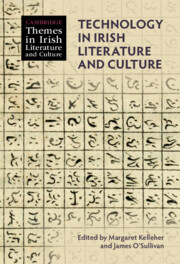Book contents
- Technology in Irish Literature and Culture
- Cambridge Themes in Irish Literature and Culture
- Technology in Irish Literature and Culture
- Copyright page
- Epigraph
- Contents
- Contributors
- Cambridge Themes in Irish Literature and Culture
- Acknowledgements
- Introduction
- Part I Genealogies
- Part II Infrastructures
- Part III Invention
- Part IV The Digital
- Chapter 14 Irish Literary Feminism and Its Digital Archive(s)
- Chapter 15 Consoling Machines in Contemporary Irish Fiction
- Chapter 16 ‘At Me Too Someone Is Looking’: Staging Surveillance in Irish Theatre
- Chapter 17 Technology in Contemporary Irish Poetry: Data at ‘the Edge of Language’
- Chapter 18 Irish Digital Literature
- Index
- References
Chapter 15 - Consoling Machines in Contemporary Irish Fiction
from Part IV - The Digital
Published online by Cambridge University Press: 19 January 2023
- Technology in Irish Literature and Culture
- Cambridge Themes in Irish Literature and Culture
- Technology in Irish Literature and Culture
- Copyright page
- Epigraph
- Contents
- Contributors
- Cambridge Themes in Irish Literature and Culture
- Acknowledgements
- Introduction
- Part I Genealogies
- Part II Infrastructures
- Part III Invention
- Part IV The Digital
- Chapter 14 Irish Literary Feminism and Its Digital Archive(s)
- Chapter 15 Consoling Machines in Contemporary Irish Fiction
- Chapter 16 ‘At Me Too Someone Is Looking’: Staging Surveillance in Irish Theatre
- Chapter 17 Technology in Contemporary Irish Poetry: Data at ‘the Edge of Language’
- Chapter 18 Irish Digital Literature
- Index
- References
Summary
This chapter draws on a series of contemporary Irish novels, charting the way everyday ‘technological objects’ – phones, laptops, computers – do more than simply sit alongside fictional characters. When we see ‘Connell’s face illuminated by the lit display’ of a phone in Sally Rooney’s Normal People (2018), we see a moment of intimacy between the characters. When Sinéad Hynes is shown ‘Googling [in bed]’ in Elaine Feeney’s As You Were (2020), we learn much about the character’s desire for privacy, her realism, her sense of humour. As the boy in Eimear McBride’s A Girl is a Half-Formed Thing (2013) hammers the controls of a computer game, or Anne Enright’s Gina in The Forgotten Waltz manages her extramarital affair on her smartphone, we see them finding refuge, expression, and intimacy in the company of their endlessly understanding machines. These are the machines that support their users, distract them, comfort them. The console consoles.
- Type
- Chapter
- Information
- Technology in Irish Literature and Culture , pp. 253 - 266Publisher: Cambridge University PressPrint publication year: 2023

